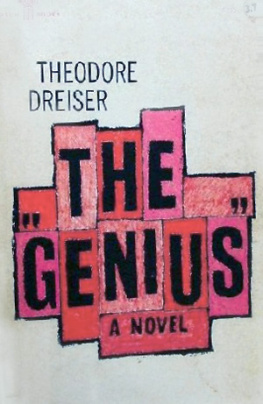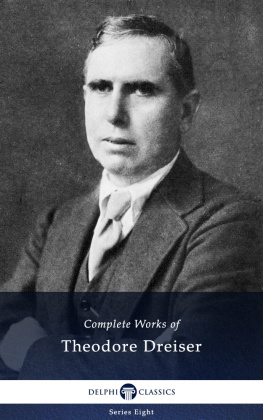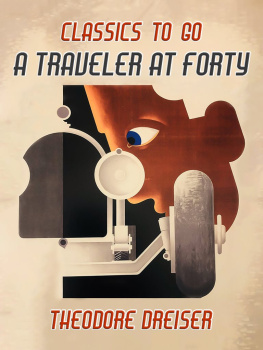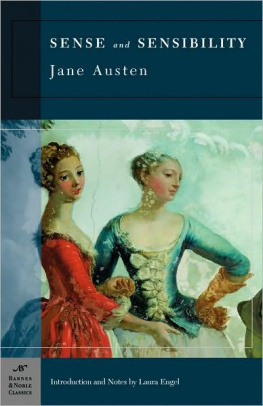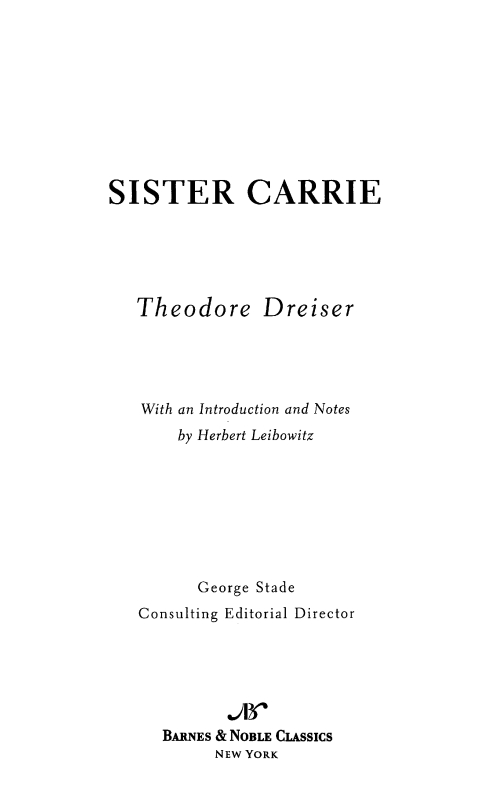
Table of Contents
From the Pages ofSister Carrie
When a girl leaves her home at eighteen, she does one of two things. Either she falls into saving hands and becomes better, or she rapidly assumes the cosmopolitan standard of virtue and becomes worse. Of an intermediate balance, under the circumstances, there is no possibility.
(page 3)
To Carrie, the one relief of the whole day would have been a jolly home, a sympathetic reception, a bright supper table, and some one to say: Oh, well, stand it a little while. You will get something better, but now this was ashes.
(page 47)
Here, then, was Carrie, established in a pleasant fashion, free of certain difficulties which most ominously confronted her, laden with many new ones which were of a mental order, and altogether so turned about in all of her earthly relationships that she might well have been a new and different individual. She looked into her glass and saw a prettier Carrie than she had seen before; she looked into her mind, a mirror prepared of her own and the worlds opinions, and saw a worse. Between these two images she wavered, hesitating which to believe.
(page 85)
Here was this greatest mystery, the man of money and affairs sitting beside her, appealing to her. Behold, he had ease and comfort, his strength was great, his position high, his clothing rich, and yet he was appealing to her.
(page 116)
Of course, youll do, said Drouet, who, in his efforts to enthuse Carrie, had interested himself. Do you think Id come home here and urge you to do something that I didnt think you would make a success of? You can act all right. Itll be good for you.
(page 141)
Use everything and abuse me and then walk off. Thats just like a woman. I take you when you havent got anything, and then when some one else comes along, why Im no good. I always thought itd come out that way.
(page 201)
Let me be everything to you from now on, he said. Dont make me worry any more. Ill be true to you. Well go to New York and get a nice flat. Ill go into business again, and well be happy. Wont you be mine?
(page 256)
The Vances could travel, they could do the things worth doing, and here she was. For what was she made, anyhow? More thought followed, and then tearstears seemed justified, and the only relief in the world.
(page 294)
Carrie reported promptly and was given a place in the line. She saw a large, empty, shadowy play-house, still redolent of the perfumes and blazonry of the night, and notable for its rich, oriental appearance. The wonder of it awed and delighted her. Blessed be its wondrous reality. How hard she would try to be worthy of it. It was above the common mass, above idleness, above want, above insignificance. People came to it in finery and carriages to see. It was ever a center of light and mirth. And here she was of it. Oh, if she could only remain, how happy would be her days!
(page 340)
Im going away. Im not coming back any more. Its no use trying to keep up the flat; I cant do it. I wouldnt mind helping you, if I could, but I cant support us both, and pay the rent. I need what little I make to pay for my clothes. Im leaving twenty dollars. Its all I have just now. You can do whatever you like with the furniture. I wont want it.
(page 388)
Sitting alone, she was now an illustration of the devious ways by which one who feels, rather than reasons, may be led in the pursuit of beauty. Though often disillusioned, she was still waiting for that halcyon day when she should be led forth among dreams become real.
(page 445)
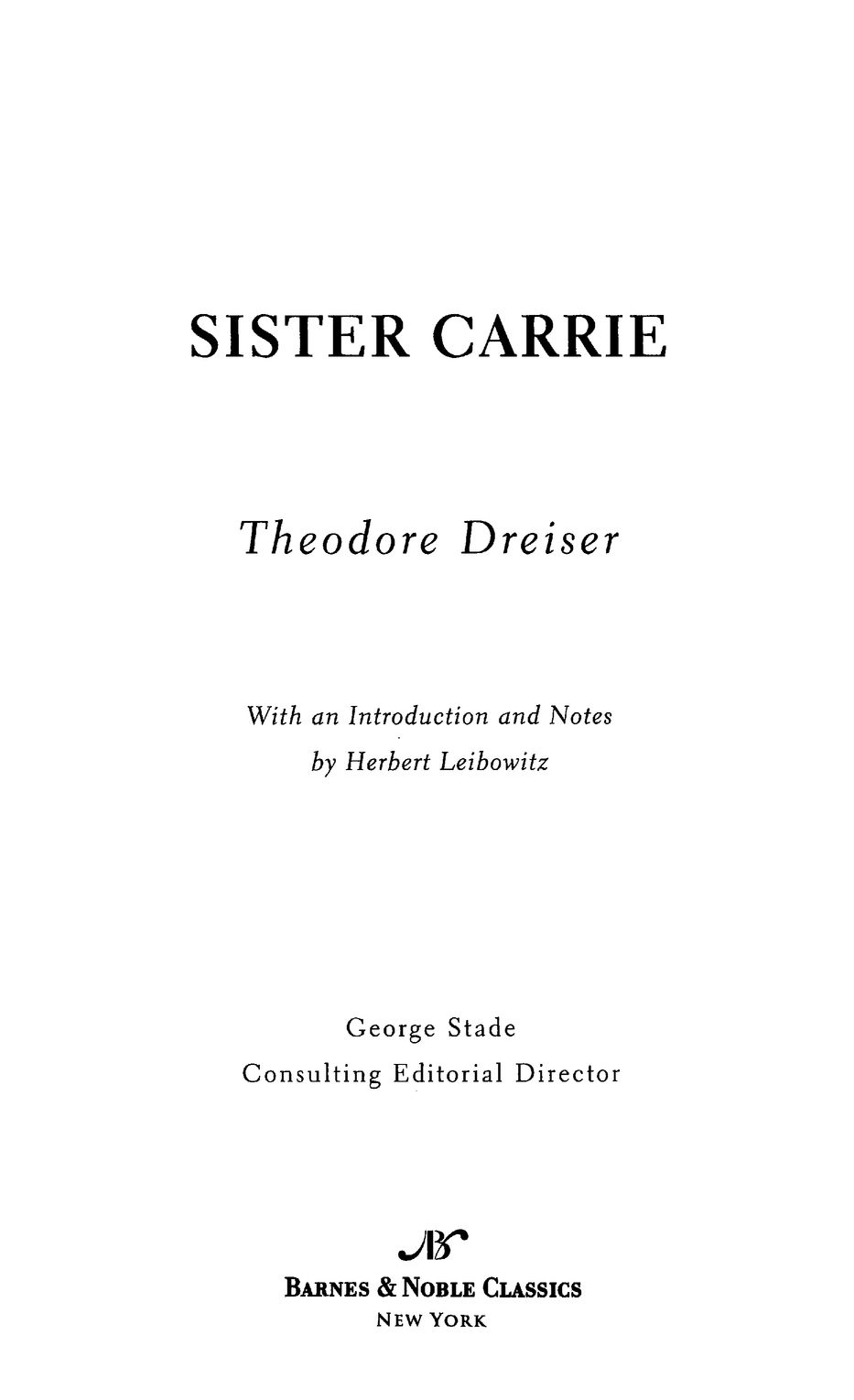
Theodore Dreiser
Theodore Dreiser was born on August 27, 1871, in Terre Haute, Indiana, the ninth of ten children. The family lived in poverty, and his brothers and sisters were rebellious and wild. At age sixteen, Theodore left home for Chicago, where he took a variety of jobs. With the help of a former teacher, he enrolled at Indiana University in 1889, but after a year he left school, aimless and uncertain about his future. By 1892 Dreiser was working as a journalist, first in Chicago and then in St. Louis. He moved to New York City in 1894, took over editorship of a monthly music magazine, and contributed his own editorials, reviews, and articles for publication. He became a prodigious writer, trying his hand at everything from short stories to poetry to drama, and published diverse articles in such popular magazines as Harpers Monthly, McClures, and Cosmopolitan. He married Sara Osbourne White, a schoolteacher, in 1898.
In 1900 Dreiser published his first novel, Sister Carrie, to mixed reviews. The book sold just 500 copies before controversy over its frank treatment of sexual relations and unpunished immorality prompted the publisher to withdraw it from sale. Dreiser began a second novel but fell into a depression so severe that his brother placed him in a sanatorium to recuperate. Emerging from treatment, Dreiser resumed editing and eventually secured a job as editor-in-chief with Butterick Publications. In 1907 Sister Carrie was reissued and Dreisers literary accomplishment acknowledged, but in 1910 a romance with the daughter of a co-worker forced him to resign his post at Butterick. Undaunted, Dreiser completed his second novel, Jennie Gerhardt (1911) and, inspired by its modest success, became a full-time writer.
Never a faithful husband, Dreiser permanently separated from his wife in 1912, but the couple never divorced. Politically, he became involved with the progressive movement, and his writings often focused on social injustice and materialism. Thanks in part to the positive reviews of social critic H. L. Mencken, Dreisers literary fame grew, but his publishers frequently censored his controversial style of realism. Dreiser devoted the next several years to various genres, including travel writing, memoirs, philosophical essays, short stories, and even poetry; he also wrote several major novels, including the first two books in the Trilogy of Desire series and The Genius (1915).
In 1919 Dreiser began an affair with his young cousin, Helen Richardson. They moved to Hollywood, where he began The Bulwark, a novel about the struggles of a Quaker family that would be published in 1946, and sought work in the movie industry. In 1925 he published An American Tragedy, a novel about a sensational murder; his first commercial success, the book won critical acclaim for its fearless, brutally honest observations of American society. In 1927 Dreiser visited the Soviet Union, and during the Great Depression, he was an outspoken critic of capitalism. Though he wrote little fiction during this time, Dreiser developed an abiding interest in the natural sciences and was involved in many social causes. His wife died in 1942, and two years later Dreiser married Helen Richardson. Theodore Dreiser died on December 28, 1945, in Hollywood, California. Two novelsThe Bulwark and The Stoic, the final installment in the Trilogy of Desirewere published posthumously.
The World of Theodore Dreiser
andSister Carrie
| 1871 | Theodore Herman Albert Dreiser is born on August 27 in Terre Haute, Indiana, the ninth of ten surviving children. His father, John Paul Dreiser, is a German immigrant and strict Roman Catholic millworker who is unable to lift the family out of poverty or exert authority over his unruly children. His mother, Sarah Schnb, who has a more romantic nature, passes no judgments on the children and wields more influence. Theodores sisters will be sexually uninhibited; the brothers will leave home as soon as they can. American novelist Stephen Crane and French writer Marcel Proust are born. The Great Fire ravages Chicago. |


